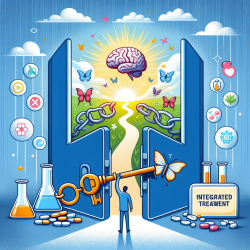Unlock the Secret to Better Outcomes: How Integrated Treatment Can Transform Lives
In the realm of behavioral health, providing comprehensive care for individuals with co-occurring disorders (CODs) related to substance use and mental health is paramount. The recent study titled Improving Medication Access within Integrated Treatment for Individuals with Co-occurring Disorders in Substance Use Treatment Agencies sheds light on the effectiveness of integrated treatment approaches and the challenges that lie within.
According to the study, only 25% of behavioral health agencies offer integrated care, and less than 7% of individuals who need it receive it. This gap in service delivery underscores a significant public health concern. The research utilized the Network for the Improvement of Addiction Treatment (NIATx) strategies to assess their effectiveness in improving access to addiction and psychotropic medications.
Key Findings
The study revealed that adherence to NIATx implementation strategies is crucial for improving medication access. Here are some key takeaways:
- Significant Improvements: Agencies that adhered to NIATx strategies showed increased access to both addiction and psychotropic medications.
- Delayed Effects: Some agencies experienced delayed improvements, suggesting that organizational changes might take time to manifest.
- Adherence Matters: High adherence to implementation strategies correlated with better outcomes, particularly in accessing addiction medications.
Implications for Practitioners
For practitioners, these findings highlight the importance of integrating comprehensive treatment plans that address both substance use and mental health disorders. Here’s how you can leverage these insights:
- Embrace Integrated Care: Advocate for and implement integrated treatment models within your practice to provide holistic care for individuals with CODs.
- Focus on Implementation Fidelity: Ensure that your team adheres to proven implementation strategies like NIATx to enhance medication access and treatment outcomes.
- Continuous Improvement: Use feedback and data-driven approaches to refine and improve treatment protocols continuously.
Encouraging Further Research
While the study provides valuable insights, it also opens the door for further research. Understanding the nuances of implementation fidelity and its impact on treatment outcomes is crucial. Practitioners are encouraged to delve deeper into how these strategies can be tailored to specific organizational contexts to maximize their effectiveness.
Moreover, exploring the barriers to medication access and how they can be overcome through innovative solutions will be vital in advancing integrated care models.
To read the original research paper, please follow this link: Improving medication access within integrated treatment for individuals with co-occurring disorders in substance use treatment agencies.










